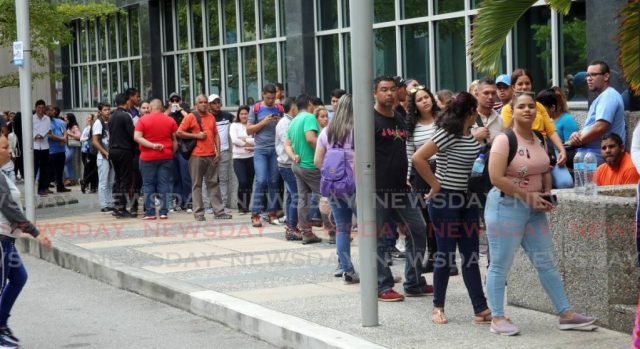
National Security Minister Stuart Young said the re-registration process for Venezuelan migrants will begin on March 8 and end on March 26.
He made the announcement on Sunday during the I on Dependency radio show on i95.5 FM.
Young said he got the re-registration process approved by Cabinet and has been, over the past couple weeks, working on the logistics of rolling out the process.
Registrants would have to first fill out a 17-A application form, which can be downloaded from the National Security website.
They would then have to complete the form, add a copy of the registration permit, passport photo, biodata or UNHCR card, proof of address and a job letter. For those who are self-employed, there would be space to input that information on the form, Young said.
Registrants would then have to write their full name, telephone number, email address and minister’s permit number on the front of the envelope.
They will then be required to drop the package off in drop boxes at the Immigration Enforcement offices on Henry Street, Port of Spain; Knox Street, San Fernando; or the Agricola Building in Tobago.
Young said the process was strictly for those who had already registered and whose time had expired under the original registration policy. He added that the registration card, while it allows for people to work and live in TT, may not automatically allow migrants to get drivers’ permits and other official documents.
He said in the first instance the re-registration would provide another six-month allowance to live and work in TT, but if people get involved in criminal activities it could mean deportation and the cancellation of the registration card.
“I know that six months passes very quickly for some,” Young said. “That decision is still being taken, but in the first instance it is six months.”
He added that employers worried about hiring Venezuelan workers can rest assured that the registered Venezuelans are allowed to work in TT, even if the registration period expires.
“I have been telling employers that the card is good as gold even if it is expired, once government promises an extension there will be one.”
Last month, Young said the process would be an opportunity for those who had registered but had not got their registration cards to do so.
He said a few of the registrants had dropped off the system and moved to other countries, while others had been rejected from the system, having had a criminal record.
In 2019, government conducted a registration process to treat with Venezuelan migrants who may have left Venezuela amid that country’s social and economic crisis. About 16,500 people were registered in that exercise. Young said the registration was intended to give migrants an opportunity to work and live in TT, and hopefully not be exploited.
Last year, the registration was extended by six months.